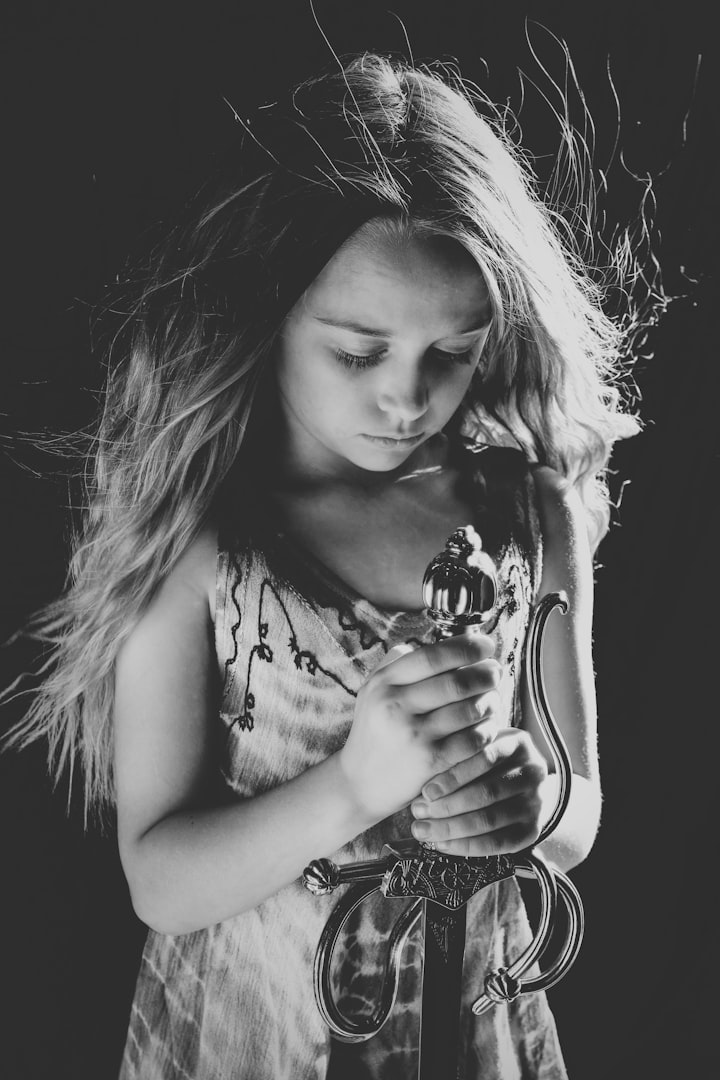Memories Are a Double-Edged Sword
Inflicting pain with cutting reminders of what is lost while engraving tattoos on our hearts as souvenirs of what defines us

“Just sell it all in a garage sale,” he said.
Dad acted tough, as if it was just a task to complete, when we trudged out to the shop in 95-degree weather to sort through boxes. He spoke like he didn’t really care what happened to the containers’ contents, the cherished memories, that accompanied him when he moved from the home he shared with Mom before she died.
The words collided with the passion in his voice. I opted to ignore the emotions and focus on organizing the garage sale; it was easier.
My mind created a system for organizing the contents. I envisioned empty boxes with prices marked on the top: 10 cents, 25, 50, $1.00 and so forth standing in a line on a table. Each box positioned to accept items whose worth equaled the number written on top. It seemed like a good plan. I don’t know what Dad expected, but I heard all the reasons my plan would not work.
“There won’t be enough room to spread the boxes throughout the shop. We need to park the car in here, and some friends said they might be here next weekend. We will need the room.”
“Let’s just start and see how it develops. Dad, it might work.”
“I can’t decide which things to keep and what to sell.”
“No time like the present.”
“It will be difficult to decide how much this stuff is worth”
“We can work through it together.”
As the reasons to postpone the task accumulated, I listened, fully aware that each box held a piece of his past. My responses didn’t directly respond to his message because what he didn’t say expressed agony. Instead, I diverted attention to our mission.
Digging through one box at a time, I started the cataloging process. Dad limited his participation, but his comments were plentiful.
“Naw, that is worth more than that!” I pretended not to hear.
“Don’t you realize that is an antique?”
“No, I didn’t know that, Dad.”
“We’ve had that in the family for over 30 years!”
Within minutes, he displayed all the symptoms of a stroke as he complained of a headache, chest pains, and a rapid heart beat.
The thought crossed my mind that I might feel the same if I spoke in exclamations.
Within moments he retreated to the house to rest. I continued unpacking and repacking containers thinking the symptoms of a stroke seemed quite similar to the symptoms of an anxiety attack. As stickers priced the remnants of his 42-year marriage, he watched as monetary values were assign to his past. Once again, we were saying good-bye to Mamma.
My hands continued to categorize the knickknacks, dishes, office supplies and stuff. Numerous mismatched cups, plates, and saucers from multiple sets of dishes emerged. “Ten cents each,” I thought and stacked them in the appropriate box. A half-used roll of shiny, gold shelf-paper rolled unto the table; it matched nothing I had ever seen in the last two houses my parents owned. It joined the dishes.
Withdrawing a plastic bag, I recognized the contents of the junk drawer: rubber bands, keys, pens, and some things unidentifiable. The junk drawer, a tradition in our house, accepted items that belonged nowhere else but might find purpose in the future.
I couldn’t believe Dad still had the plastic Strawberry Shortcake cups my daughters drank from before they were old enough to hold a glass. Five pieces of crunchy dog food clustered in the corner of a box — remnants of Angel, their pet Chihuahua. Startled, I jumped when my hands touched, and my mind identified, a set of false teeth. The gold cap on the front eyetooth and the familiar smile, identified them as my mothers.
While I revisited days gone by, the morning slipped away.
Dad returned feeling better and contributed by answering questions about items stacked on a table to my right. The postage-stamp-size picture that had emerged from the bottom of a box he explained was the only remaining picture of my great, great grandparents. The pink baby booties in the padded, floral box might be mine. The collection of record albums must remain upstairs because there is no telling what they might be worth.
Then we discussed the destination of the dolls — dolls wearing crocheted dresses with matching petticoats, boots, and hats. “What should I do with the dolls, Dad?”
He shrugged, shook his head and muttered, “Whatever you think.” Then he relapsed to the chair in the air-conditioned house with sharp chest pains and a headache. Four boxes of dolls headed to my house, a decision for another day.
I forced myself to approach the project as a chore as it was easier to encounter each item as an object rather than a memory.
I sympathized with Dad because I also found myself reliving precious memories. I understood he witnessed more than material possessions. Dad saw Mom’s smile; he heard events gone by; he felt emotions long forgotten.
Now, nearly 20 years later, Dad periodically asks about Mom’s belongings.
“Her Eagle’s lodge vest?”
“In the cedar chest.”
“Her personalized license plate?
“Chris has it.”
“Her dolls?”
“Each of the grandchildren and great-grandchildren have one.”
I assured him that her memory resides in each of our homes in one form or another.
The day of the garage sale, we cried over our loss. However, rummaging through the boxes encouraged conversations about Mom, reminding us of her unconditional love for family, wisdom that honesty inspires trust, laughter at daily events. We recalled the first time Mom held each grandchild, the night Dad and she danced as King and Queen at the Eagle Lodge’s Valentine banquet, and the way she would sing off tune in church.
When she was alive hundreds of hours were consumed on Saturdays driving through subdivisions, exploring other’s castoffs, and discovering key finds. Mom always said, “One person’s trash is another person’s treasure.’
A contentment enveloped me upon realizing I had spent the day doing something Mom loved. If she stood beside me, it would have been a perfect day; however, I felt her presence. She would approve.
For more true stories that share life, love, and family visit my blog I AM My Best!
About the Creator
Brenda Mahler
Travel
Writing Lessons
Memoirs
Poetry
Books AVAILABLE ON AMAZON.
* Lockers Speak: Voices from America's Youth
* Understanding the Power Not Yet shares Kari’s story following a stroke at 33.
* Live a Satisfying Life By Doing it Doggy Style explains how humans can life to the fullest.






Comments
There are no comments for this story
Be the first to respond and start the conversation.